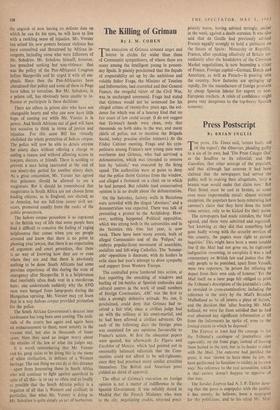The Killing of Grimau
By J. M. COHEN
THE execution of Grimau aroused anger and horror in circles far wider than those of Communist sympathisers, of whom there are many among the intelligent young in present- day Spain. It plainly proclaimed that the façade of respectability set up by the ambitious and voluble Sefior Fraga, the Minister of Tourism and Information, had crumbled and that General Franco, the vengeful victor of the Civil War, was in unchanged command. Fraga had stated that Grimau would not be sentenced for his alleged crimes of twenty-five years ago, the evi- dence for which was of a hearsay kind that no fair court of law could accept. (I do not suggest that Grimau's hands were clean, only that thousands on both sides in the war, and many chiefs of police, not to mention the Brigada Social, today practise similar tortures.) At the Friday Cabinet meeting, Fraga and his sym- pathisers among Franco's new young men were overborne and Grimau, who had survived a defenestration, which was intended to remove him by `suicide,' was executed by the firing squad. The authorities were at pains to deny that the police threw Grimau from the window, and alleged a footmark on a chair on to which he had jumped. But reliable (and conservative) opinion is in no doubt about the defenestration.
On the Saturday, factory walls in Barcelona were scrawled with the slogan `Asesinos,' and a demonstration was expected. There was talk of presenting a protest to the Archbishop. How- ever, nothing happened. Political opposition, which was strong both in the universities and in the factories this time last year, is now weak. There have been many arrests, both of alleged Communists and of the `Felipes,' an embryo popular-front movement of anarchists, socialists and left-wing Catholics. The 'honour- able' opposition is dormant, with its leaders in exile since last year's attempt to draw sympathy and support from Western Europe.
The controlled press lumbered into action, at first reporting the smashing of windows and hurling of ink-bottles at Spanish embassies and cultural centres as the work of small numbers of foreign Communists. ABC was the first to take a strongly defensive attitude. No one, it proclaimed, could deny that Grimau had re- ceived a fair trial, since a civilian judge had sat with the military at his court-martial, and he had been allowed a civilian advocate. On each of the following days the foreign press was examined for any opinions favourable to Franco's action. At first the obscurest papers were quoted, but afterwards Le Figaro and Excelsior of Mexico, which had pointed out in reasonably balanced editorials that the Com- munists could not afford to be self-righteous, since they had practised many similar atrocities themselves. The British and American press yielded no shred of approval.
The effect of Grimau's execution on foreign opinion is not a matter of indifference to the Spanish Government. It was reliably stated in Madrid that the French Ministers who were in the city, negotiating credits, returned preci- pitately home, having advised strongly, earlier in the week, against a death sentence. It was also said that de Gaulle had previously advised Franco equally strongly to hold a plebiscite on the future of Spain: Monarchy or Republic. Franco, after speaking effusively of Britain im- mediately after the breakdown of the Common Market negotiations, is now becoming a client of France. Foreign capital—German, Dutch and American, as well as French—is pouring into the country. New factories are springing up rapidly, for the manufacture of foreign products by cheap Spanish labour for export to non- European markets. A crisis of confidence might prove very dangerous to the top-heavy Spanish economy.






































 Previous page
Previous page